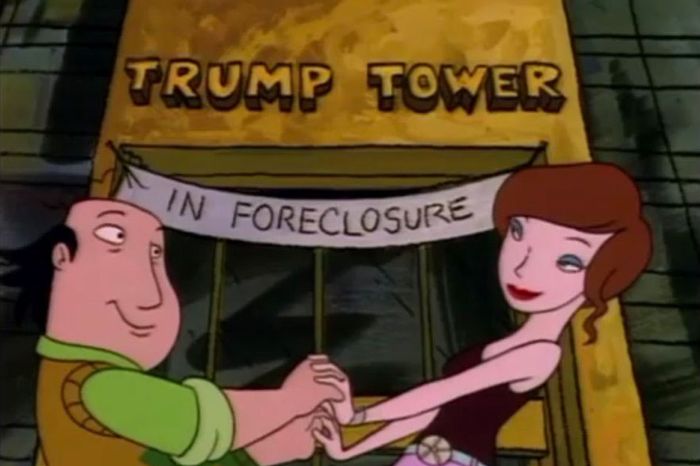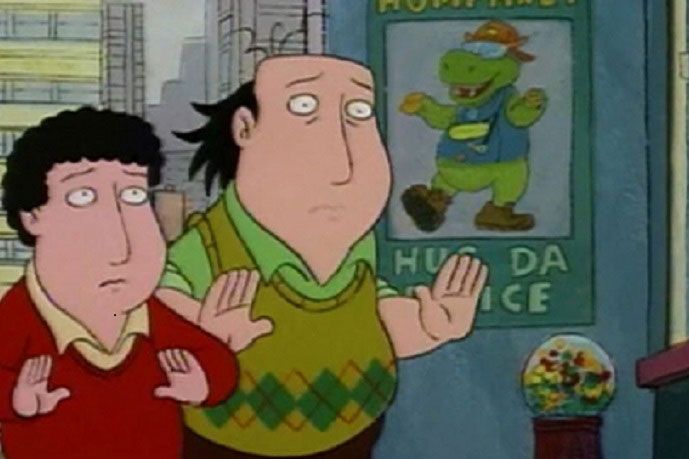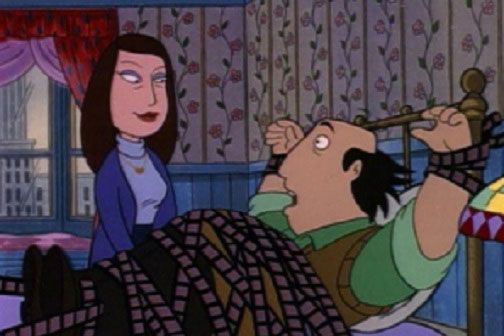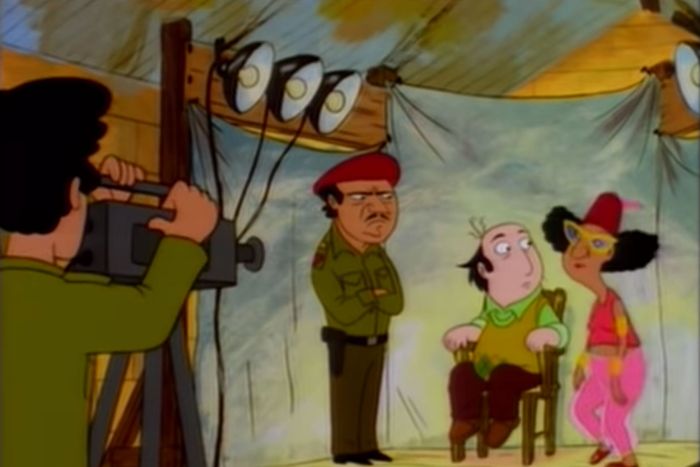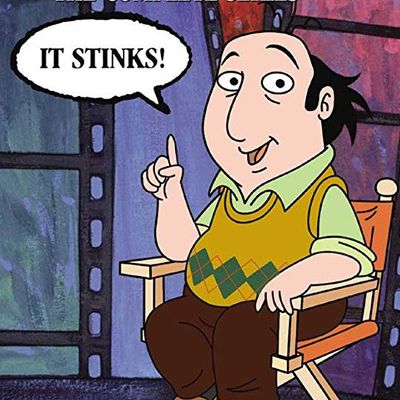
It’s been 25 years since The Critic premiered in late January 1994, and almost 24 years since its cancellation — first by ABC, after six episodes, and then by Fox after a full but fraught season. But with its stellar pedigree and cult cachet, The Critic regularly turns up on lists of the most underrated animated series of all time or the animated series most in need of a reboot. We can’t quit Jay Sherman.
Voiced by (and created for) Jon Lovitz, Sherman, on paper, looked like a winner. He was a nationally renowned, Pulitzer Prize–winning film critic who pulled down an over $200,000 salary and lived in a Manhattan penthouse apartment. But his was hardly the glamorous life. Divorced, he was the quintessential sad sack. “I’m 36 years old, I’m lonely, my hair comes out of a spray can,” he kvetches in the pilot episode. At another point, when the fates turn against him, he cries, “My shrink was right: God does hate me.”
On paper, too, The Critic looked like a sure thing. Its creators, Al Jean and Mike Reiss, were showrunners on The Simpsons during its classic third and fourth seasons. Emmy and Oscar–winner James L. Brooks, whose TV credits include The Mary Tyler Moore Show, Taxi, and The Simpsons, served as executive producer. Brad Bird (The Incredibles) was an executive consultant. The character design team included David Silverman (The Simpsons), future Oscar-winner Rich Moore (Zootopia), David Cutler (The Nightmare Before Christmas), and Everett Peck (Duckman). Writers included Judd Apatow, Steven Levitan, and Nell Scovell. “Trying to reassemble our writing staff [today] I think would cost $100 million,” jokes Al Jean in a phone interview.
Lovitz was the only choice to embody Sherman. Brooks had pitched Jean and Reiss on developing a live-action series about the backstage life of a Today–style morning show. One of the characters with comic potential would be a Gene Shalit–like movie critic. Brooks had seen Lovitz in A League of Their Own and suggested him for that character. Jean realized that Lovitz’s burgeoning movie career would make it impossible for him to do a live-action series. He suggested they create an animated series, which would open up a world of creative possibilities, including what would become the series’ trademark movie parodies. “You’d think we would have thought of that first,” Jean says, “but it was the last aspect of the creation. Mike and I wrote the pilot and then we had a script that could only be done by Jon Lovitz. It put him in a pretty strong bargaining position.”
In addition to Lovitz, the voice cast included Christine Cavanaugh as Marty, Sherman’s loving son; Judith Ivey as his blue-blooded adoptive mother; Gerrit Graham as Sherman’s addled father (he didn’t really have a stroke, the family just says that to explain his personality); Charles Napier as Duke Phillips, the Ted Turner–esque network owner; and Maurice LaMarche as a bevy of incidental characters and parodied celebrities, most notably Orson Welles. He performed 24 different voices in the episode “Dr. Jay” alone.
“My time on The Critic was one of the happiest work experiences of my career,” LaMarche said in an email. “Getting to work alongside such brilliant actors, and performing the scripts of such amazing and hilarious writers, I felt like pinching myself every week. I’d been hearing Jim Brooks’s laugh on the soundtrack of Taxi and The Mary Tyler Moore Show for years, and to hear that same distinctive laugh when I delivered lines in his show was a dream come true.”
In less than a year, the dream was over. The Critic initially received good reviews (even one by Roger Ebert himself), but it was an ill fit at ABC. It was scheduled after the more family-friendly Home Improvement, whose viewers did not appreciate its edgy, risqué humor and arcane references to the likes of George S. Kaufman and Moss Hart. Jean and Reiss received actual hate mail from outraged parents who said they would not let their children watch the show. “It was a different style of humor [from Home Improvement],” Jean says. “Bob Iger [then the president of ABC] asked us, ‘Where would you put it on the schedule?,’ and we didn’t have a good answer. I didn’t blame him for canceling the series.”
Over at Fox, The Critic was a natural fit with The Simpsons, but it was killed by a network president who hated the show and refused to promote it, according to Reiss’s recent memoir, Springfield Confidential.
Twenty-five years later, television has caught up with The Critic’s ribaldry and penchant for cutaway gags, later a signature device on Family Guy and 30 Rock. To mark its anniversary, we asked Jean to select five episodes that best embody the series’ comedic universe.
“Siskel & Ebert & Jay & Alice” (Season 2, Episode 2)
The Critic hails from a time when film critics bestrode this narrow world like Colossi. The most prominent among them were Gene Siskel and Roger Ebert, who, as the hosts of the syndicated movie review series Siskel & Ebert, became America’s most influential movie critics. “As far as I know, they are the first people who became household words who did nothing but review movies,” director Sydney Pollack told the Los Angeles Times in 1995 on Siskel & Ebert’s 20th anniversary. “They’ve popularized movie reviewing so that it is brought into everybody’s home.”
“They were really iconic,” Jean says. “I don’t think there would have been a show without Roger and Gene.” This episode, in which Siskel and Ebert break up and each recruits Jay to be his partner, is “everybody’s favorite,” Jean says. “I had the privilege of flying to Chicago from L.A. to record [them]. Roger was hands-off; Gene called me with a couple of notes. After just about every take, Siskel would ask which was one them was best. Like somebody’s grandmother, I’d go, ‘Oh, you’re both great.’ I can say now that they’ve both sadly passed, I think Roger was a little better actor. When Gene died, my cousin was in his class, and clips of that episode were shown in tribute. That was a wonderful thing to hear.”
“Pilot” (Season 1, Episode 1)
Meet Jay Sherman, host of the movie-review show Coming Attractions. Siskel and Ebert had thumbs up or down; Jay Sherman had “it stinks.” Jay’s most regular viewers are “drunken frat boys who like to make fun of me.” But when a beautiful actress professes to be his biggest fan and says she loves him, his family suspects she is using him so he’ll give her new film a good review. Spoiler alert: They’re right, but Jay’s integrity — one of his few saving graces — compels him to give her awful performance a pan. “It’s impossible not to like this guy,” Ebert wrote at the time; he was in the minority.
“You always want a sympathetic lead character,” Jean reflects. “The problem in the first year was that Jay was written as a loser and people kept calling him a loser. I never realized at that point that Homer Simpson may not be a winner, but he doesn’t think of himself as a loser. He enjoys his life and Marge loves him. We tested the show after it had aired and found that Jay was considered too unlikable. Jim [Brooks] faced the same situation on The Mary Tyler Moore Show. Rhoda was considered too unlikable, so they had Bess, Phyllis’s daughter, say, ‘I like Rhoda,’ and that made the whole thing work. In our second season, we created a girlfriend for Jay [voiced by Park Overall] and we softened Jay’s character design with a more rounded head and bigger pupils. The testing went up. We were canceled for other reasons.”
“A Little Deb Will Do Ya” (Season 1, Episode 5)
In this episode, Jay’s sister Margo is forced by her domineering mother to attend a debutante ball, while Jay is challenged in the ratings by Humphrey the Hippo. The episode is credited to Scovell and was directed by Lauren MacMullan (who would go on to win an Oscar for the 2013 Mickey Mouse cartoon Get a Horse!). It was perhaps the first time a prime-time animated series boasted a woman writer and director. “Lauren is a brilliant animation director, one of the best I ever worked with,” Jean says. “This was a good episode about Jay’s family. Nancy Cartwright voiced Margo. We had passed on Lisa Kudrow, Jennifer Aniston, and Margaret Cho for that character. We just didn’t think they had the right voice.”
Just how snakebit was The Critic? Jean calls this episode one of his favorites. “It was going to be our test episode; if the ratings were good, we might get picked up [for another season]. But it aired on the night the world tuned in to the Winter Olympics to watch Tonya Harding and Nancy Kerrigan. We got killed.”
“Miserable” (Season 1, Episode 4)
This one gets way dark as lovelorn Jay is held captive by a mad projectionist voiced by Pamela Reed. “It was the funniest episode of the first season,” Jean says. ”It was supposed to air second, but we had already had sexual content in the pilot, and this was a strange relationship that Jay had with this woman; he dates her after she gets out of prison. [The network] pushed it to fourth. During a chase scene at the end of the episode, the music is fast-paced until the car is seen going over a bridge and we played the theme from Taxi, which is sweet and mellow. I love doing that kind of joke that arises from the situation. It’s one of my favorite things we ever did.”
“Sherman of Arabia” (Season 2, Episode 2)
Another thing Jean concedes might have put off viewers was that The Critic could get surreal. “At that time, The Simpsons was getting weirder after being more realistic, but by that time people had bought into the characters,” he says. Speaking of weirdness, one of his favorite recurring characters, whom Jay’s son Marty refers to as “that funny-looking kid from Easter Island” (a statue come to life), makes an appearance in this episode. “I love Lawrence of Arabia, and redoing it with these characters and satirizing the Gulf War was really wonderful. I loved Jay’s morale-boosting rendition of ‘The Lion Sleeps Tonight.’ This is my second-favorite episode of the second year.”
Twenty-five years on, what can we learn from The Critic? “Just that your hero can be an antihero like Tony Soprano, but you have to be rooting for that person even if they’re not doing great things,” Jean said. “We had funny stuff in the first season, but we didn’t have that reliability. Also, never give up; do something you believe in, hire the best people, and you will have made something that will have an afterlife.”
The Critic’s afterlife included reruns on Comedy Central and newly-produced webisodes (“the last hope for fading stars”) in 2000–2001. But Jean still hasn’t given up hope for a Jay Sherman–aissance. “I just had lunch with Jon the other day,” he said. “I can’t work on it while I’m at The Simpsons, but I was thinking what Jay would be doing now; I have a theory.”
And if that theory doesn’t pan out, it stinks.



